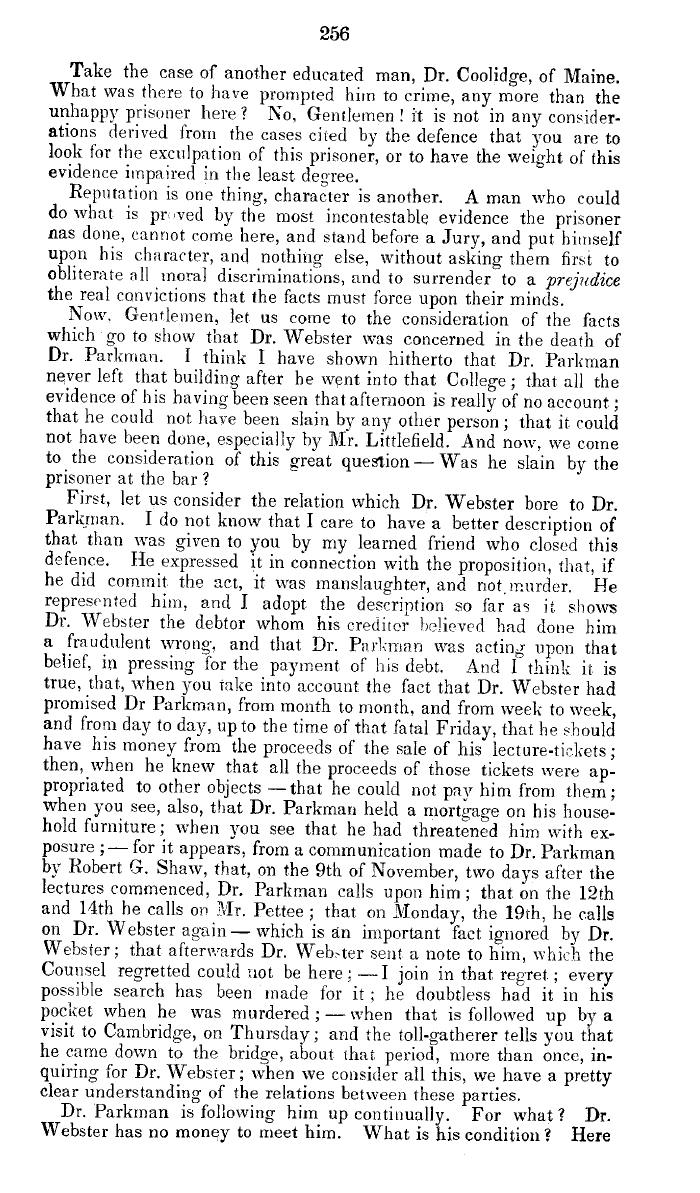|
256
Take the case of another educated man, Dr. Coolidge, of Maine.
What was there to have prompted him to crime, any more than the
unhappy prisoner here ? No, Gentlemen ! it is not in any consider-
ations derived from the cases cited by the defence that you are to
look for the exculpation of this prisoner, or to have the weight of this
evidence impaired in the least degree.
Reputation is one thing, character is another. A man who could
do what is pn:ved by the most incontestable evidence the prisoner
nas done, cannot come here, and stand before a Jury, and put himself
upon his character, and nothing else, without asking them first to
obliterate all moral discriminations, and to surrender to a prejudice
the real convictions that the facts must force upon their minds.
Now. Gentlemen, let us come to the consideration of the facts
which go to show that Dr. Webster was concerned in the death of
Dr. Parkman. I thinly I have shown hitherto that Dr. Parkman
never left that building after be went into that College ; that all the
evidence of his having been seen that afternoon is really of no account ;
that he could not, have been slain by any other person; that it could
not have been dune, especially by Mr. Littlefield. And now, we come
to the consideration of this great question- Was he slain by the
prisoner at the bar ?
First, let us consider the relation which Dr. Webster bore to Dr.
Park man. I do not know that I care to have a better description of
that, than ,vas given to you by my learned friend who closed this
defence. He expressed it in connection with the proposition, that, if
he did commit the act, it was manslaughter, and not irurder. He
represented him, and I adopt the description so far as it shows
Dr. Webster the debtor whom his crediter believed had done him
a fraudulent wrong, and that Dr. Parl;man was acting upon that
belief, in pressing for the payment of his debt. And I think it is
true, that, when you take into account the fact that Dr. Webster had
promised Dr Parkman, from month to month, and from week to week,
and from day to day, up to the time of that fatal Friday, that he should
have his money from the proceeds of the sale of his lecture-tic Bets;
then, when he knew that all the proceeds of those tickets were ap-
propriated to other objects -that he could not pay him from them;
when you see, also, that Dr. Parkman held a mortgage on his house-
hold furniture; when you see that he had threatened him vith ex-
posure ;- for it appears, from a communication made to Dr. Parkman
by Robert .G. Shaw, that, on the 9th of November, two days after the
lectures commenced, Dr. Parkman calls upon him ; that on the 12th
and 14th he calls on it~lr. Pettee ; that on Monday, the 19th, he calls
on Dr. Webster again-which is an important fact ignored by Dr.
Webster; that afterwards Dr. Web~ter sent a note to him, which the
Counsel regretted could not be here; - I join in that regret; every
possible search has been trade for it; he doubtless bad it in his
pocket when he was murdered ; - when that is followed up by a
visit to Cambridge, on Thursday; and the toll-gatherer tells you that
he came down to the bridge, about that, period, more than once, in-
quiring for Dr. Webster; when we consider all this, we have a pretty
clear understanding of the relations between these parties.
Dr. Parkman is following him up continually. For what ? Dr.
Webster has no money to meet him. What is his condition? Here
|

